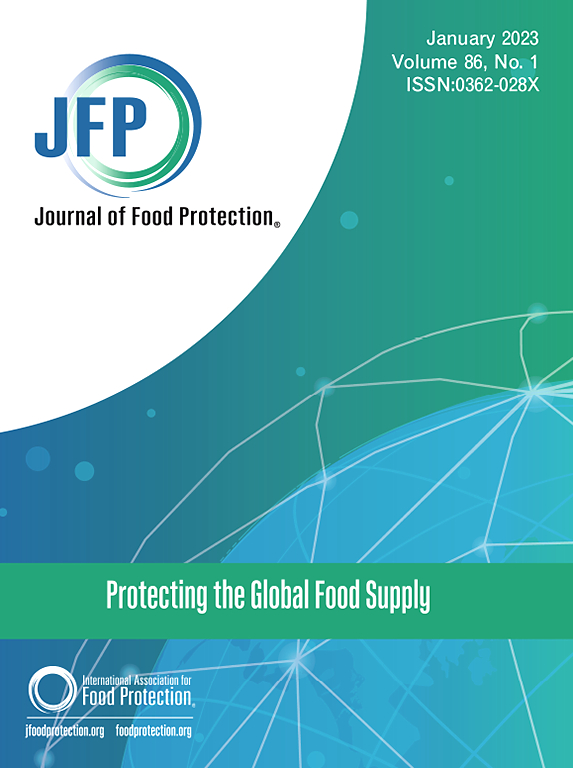An Outbreak Investigation of Salmonella Weltevreden Illnesses in the United States Linked to Frozen Precooked Shrimp Imported from India – 2021
IF 2.1
4区 农林科学
Q3 BIOTECHNOLOGY & APPLIED MICROBIOLOGY
引用次数: 0
Abstract
In 2021, the U.S. Food and Drug Administration (FDA), Centers for Disease Control and Prevention (CDC), and state partners investigated a multistate sample-initiated retrospective outbreak investigation (SIROI) consisting of a cluster of nine Salmonella Weltevreden illnesses associated with frozen, precooked shrimp imported from India. Import surveillance testing identified Salmonella Weltevreden recovered from a cooked shrimp sample from Supplier B. In total, nine patients with clinical isolates highly related via whole genome sequencing were reported in four states with illness onset dates between February 26 and July 17, 2021. Epidemiologic data were gathered by state partners for seven patients, who all reported exposure to shrimp. Five patients reported consuming shrimp cocktail from the same retailer. A traceback investigation for five of the six patients converged on Supplier B. This evidence demonstrated that the outbreak of Salmonella Weltevreden illnesses was caused by the consumption of cooked, ready-to-eat shrimp manufactured by Supplier B. At the time of the investigation, outbreak and recall information was shared with Indian competent authorities. In March 2022, a follow-up inspection of Supplier B’s facility in India was conducted, and insanitary conditions and practices were observed. This outbreak investigation highlighted the importance of multidisciplinary national and international public health partnerships. The lessons learned from this investigation should continue to inform investigational activities and food safety guidance for the industry.
美国与印度进口冷冻预煮虾有关的 Weltevreden 沙门氏菌疾病爆发调查 - 2021 年。
2021 年,美国食品和药物管理局 (FDA)、美国疾病控制和预防中心 (CDC) 以及各州合作伙伴调查了一起多州样本启动的回顾性疫情调查 (SIROI),该调查由 9 起 Weltevreden 沙门氏菌病例组成,这些病例与从印度进口的冷冻预煮虾有关。进口监控检测发现,从供应商 B 的熟虾样品中发现了 Weltevreden 沙门氏菌。通过全基因组测序,四个州共报告了九名临床分离株高度相关的患者,发病日期在 2021 年 2 月 26 日至 7 月 17 日之间。州合作伙伴收集了七名患者的流行病学数据,所有患者均报告接触过虾。五名患者报告从同一零售商处购买了鸡尾酒虾。对六名患者中的五名患者进行的追踪调查结果显示,这五名患者均为供应商 B。这些证据表明,韦尔特弗瑞登沙门氏菌疾病的爆发是由食用供应商 B 生产的熟制即食虾引起的。2022 年 3 月,对供应商 B 在印度的工厂进行了后续检查,发现了不卫生的条件和做法。此次疫情调查凸显了多学科国家和国际公共卫生伙伴关系的重要性。从这次调查中吸取的经验教训应继续为调查活动和行业食品安全指导提供参考。
本文章由计算机程序翻译,如有差异,请以英文原文为准。
求助全文
约1分钟内获得全文
求助全文
来源期刊

Journal of food protection
工程技术-生物工程与应用微生物
CiteScore
4.20
自引率
5.00%
发文量
296
审稿时长
2.5 months
期刊介绍:
The Journal of Food Protection® (JFP) is an international, monthly scientific journal in the English language published by the International Association for Food Protection (IAFP). JFP publishes research and review articles on all aspects of food protection and safety. Major emphases of JFP are placed on studies dealing with:
Tracking, detecting (including traditional, molecular, and real-time), inactivating, and controlling food-related hazards, including microorganisms (including antibiotic resistance), microbial (mycotoxins, seafood toxins) and non-microbial toxins (heavy metals, pesticides, veterinary drug residues, migrants from food packaging, and processing contaminants), allergens and pests (insects, rodents) in human food, pet food and animal feed throughout the food chain;
Microbiological food quality and traditional/novel methods to assay microbiological food quality;
Prevention of food-related hazards and food spoilage through food preservatives and thermal/non-thermal processes, including process validation;
Food fermentations and food-related probiotics;
Safe food handling practices during pre-harvest, harvest, post-harvest, distribution and consumption, including food safety education for retailers, foodservice, and consumers;
Risk assessments for food-related hazards;
Economic impact of food-related hazards, foodborne illness, food loss, food spoilage, and adulterated foods;
Food fraud, food authentication, food defense, and foodborne disease outbreak investigations.
 求助内容:
求助内容: 应助结果提醒方式:
应助结果提醒方式:


